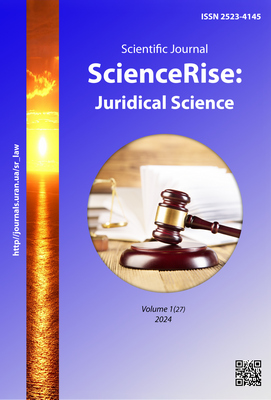Application of artificial intelligence in motivating court decisions in criminal proceedings: international experience and prospects for Ukraine
DOI:
https://doi.org/10.15587/2523-4153.2024.301533Keywords:
court decision, artificial intelligence, motivation, reasonableness, justice, criminalprocedure, evidence, evidenceassessment, fairtrialAbstract
The article is devoted to the study of the opportunities and challenges of using artificial intelligence in criminal proceedings, namely, in the course of reasoning court decisions. The use of specialized knowledge by a judge is an important aspect in this process, especially in the context of analyzin gevidence and its legal assessment. The use of artificial intelligence in this area can be an important innovation to improve the quality of court decisions and ensure greater objectivity in justice. Artificial intelligence technologies are developing rapidly, and their potential application in criminal proceedings has become a subject of deep interest among both the scientific community and legal professionals.
Based on the analysis of artificial intelligence systems, which are already used in judicial proceedings (the HART system in the United Kingdom, the Bail Assistant program in Australia, the Supreme Court Portal for Promoting Court Efficiency (SUPACE) in India, artificial intelligence systems in Brazil, Saudi Arabia, and the United Arab Emirates), the author has established that the use of artificial intelligence provides a number of useful tools and advantages in evaluating evidence and reasoning a court decision. Thus, it has been determined that the analysis of large amounts of data can help identify patterns and trends in law enforcement, and certain software can influence the prediction of risks and the identification of effective strategies for responding to them.
In addition, the author identifies a number of serious challenges and risks, associated with the use of artificial intelligence technologies in criminal proceedings: protection of personal data, transparency and clarity of artificial intelligence algorithms, etc. According to the study, it is established that the use of artificial intelligence in the process of reasoning court decisions is possible subject to the development and implementation of effective legal mechanisms, which will allow coordinating and regulating this process. Also, the implementation of relevant changes to the criminal justice system of Ukraine should be carried out with a balanced and scientifically sound approach that allows weighing the potential risks and benefits and developing recommendations for the proper practical and ethical use of artificial intelligence technologies
References
- Kryminalnyi protsesualnyi kodeks Ukrainy (2012). Kodeks Ukrainy No. 4651-VI. 13.04.2012. Available at: https://zakon.rada.gov.ua/laws/show/4651-17#Text
- Sartor, G., Branting, K. (1998). Judicial Applications of Artificial Intelligence. Springer Science+Business Media B.V., 222. https://doi.org/10.1007/978-94-015-9010-5
- Hallevy, G. (2013). When robots kill: artificial intelligence under criminal. Northeastern University Press, 272. Available at: https://www.researchgate.net/publication/290246169_When_Robots_kill_Artificial_intelligence_under_criminal_law
- Brennan-Marquez, K., Henderson, S. E. (2018). Artificial Intelligence and Role-Reversible Judgment. Journal of Criminal Law and Criminology, 109. https://doi.org/10.2139/ssrn.3224549
- Allen, R. (2001). Artificial intelligence and the evidentiary process: The challenges of formalism and computation. Artificial Intelligence and Law, 9 (2/3), 99–114. https://doi.org/10.1023/a:1017941929299
- Radutnyi, O. (2017). Artificial intelligence as a subject of crime. Information and law, 4 (23), 106–115. https://doi.org/10.37750/2616-6798.2017.4(23).273130
- Plakhotnik, O. (2019). Practical use artificial intelligence in criminal proceeding. Herald of Criminal Justice, 4, 45–57. https://doi.org/10.17721/2413-5372.2019.4/45-57
- Bazarov, S. (2022). The use of artificial intelligence in the judiciary: theory and practice. Jurisprudence, 2 (3), 39–47. https://doi.org/10.51788/tsul.jurisprudence.2.3./hhkt6836
- European ethical Charter on the use of Artificial Intelligence in judicial systems and their environment’ (2018). Council of Europe. Available at: https://rm.coe.int/ethical-charter-en-for-publication-4-december-2018/16808f699c
- Artificial Intelligence, the Brazilian Judiciary and Some Conundrums (2023). SciencesPo. Eduardo Villa Coimbra Campos, Available at: https://www.sciencespo.fr/public/chaire-numerique/en/2023/03/03/article-artificial-intelligence-the-brazilian-judiciary-and-some-conundrums/
- Brehm, K. et al, (2020). The Future of AI in Brazilian Judicial System: AI Mapping, Integration, and Governance. Available at: https://itsrio.org/en/publicacoes/the-future-of-ai-in-the-brazilian-judicial-system/
- Khan, A. (2023). AI-powered Indian judiciary: A step forward or cause for concern? Bar and Bench. Available at: https://www.barandbench.com/columns/litigation-columns/ai-powered-indian-judiciary-a-step-forward-cause-concern
- Mehra, S. (2021). AI is set to reform justice delivery in India, INDIAai. Available at: https://indiaai.gov.in/article/ai-is-set-to-reform-justice-delivery-in-india
- Justice minister inaugurates Virtual Enforcement Court in Saudi Arabia, Zawya (2022). Available at: https://www.zawya.com/en/legal/justice-minister-inaugurates-virtual-enforcement-court-in-saudi-arabia-p5dhnpu7
- Rasheed, A. (2022). Abu Dhabi criminal cases now followed up by artificial intelligence, Gulf News. Available at: https://gulfnews.com/uae/crime/abu-dhabi-criminal-cases-now-followed-up-by-artificial-intelligence-1.89792712
Downloads
Published
How to Cite
Issue
Section
License
Copyright (c) 2024 Tetiana Lotysh

This work is licensed under a Creative Commons Attribution 4.0 International License.
Our journal abides by the Creative Commons CC BY copyright rights and permissions for open access journals.
Authors, who are published in this journal, agree to the following conditions:
1. The authors reserve the right to authorship of the work and pass the first publication right of this work to the journal under the terms of a Creative Commons CC BY, which allows others to freely distribute the published research with the obligatory reference to the authors of the original work and the first publication of the work in this journal.
2. The authors have the right to conclude separate supplement agreements that relate to non-exclusive work distribution in the form in which it has been published by the journal (for example, to upload the work to the online storage of the journal or publish it as part of a monograph), provided that the reference to the first publication of the work in this journal is included.








